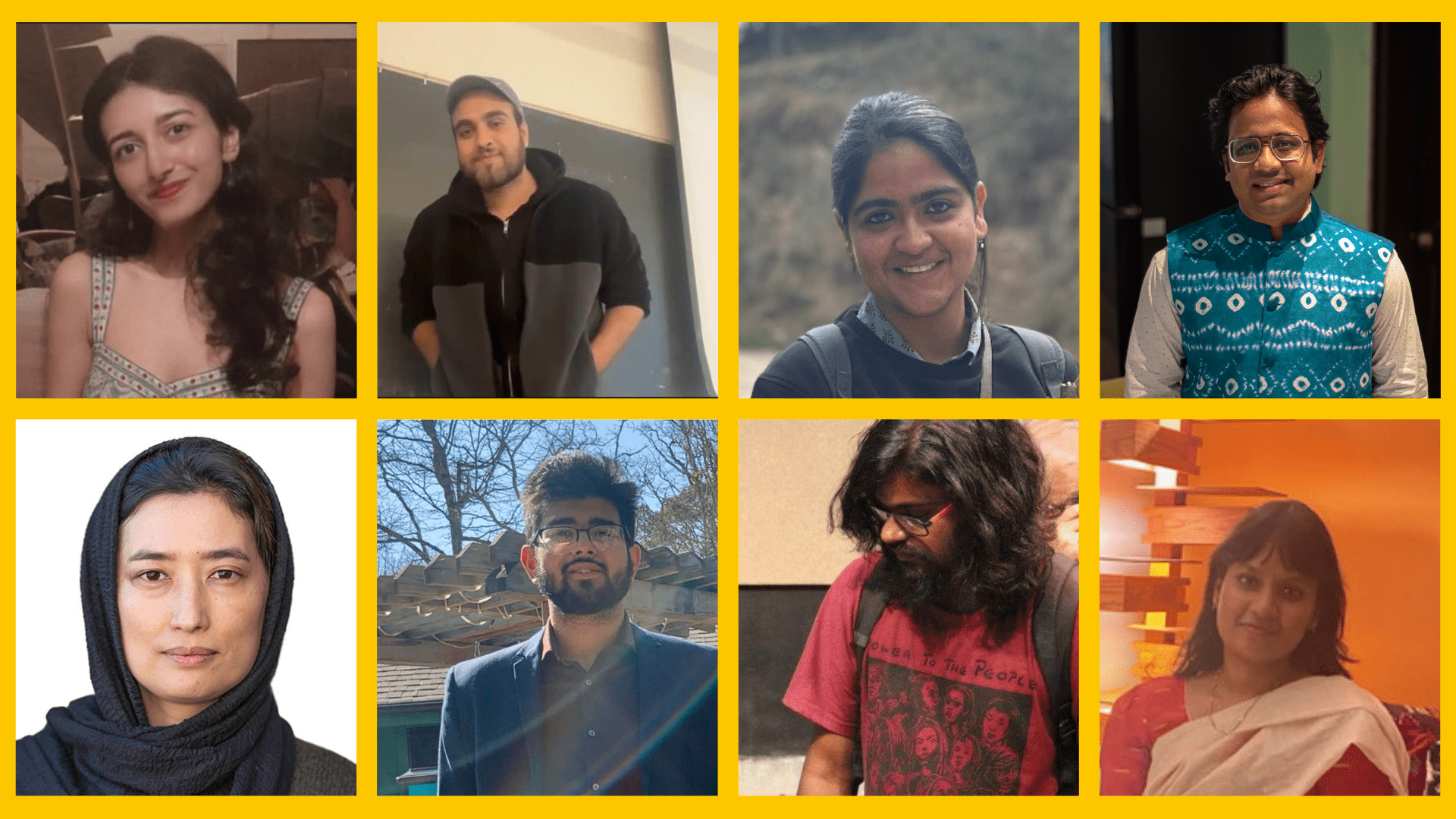Announcing the 2025 Center for South Asian Studies Graduate Fellows
The Humanities Institute is thrilled to help announce the 2025 Center for South Asian Studies Graduate Fellows. This graduate fellowship supports research and research-based travel projects related to South Asia, including conferences and conference travel.
A total of eight graduate fellows from a range of fields – including Sociology, Literature, Politics, History, and Economics – will each receive $1,000 for their research projects, which demonstrate many different intellectual commitments and interests, from investigating the intersection of climate change and its connection to gender inequality in India to examining the postcolonial industrialization and economic development of Delhi. Please see below for more details on each graduate fellow and their project.

(From top left to right: Shatakshi Singh, Sameem Wami, Sagarika Pandey, Md Mizanur Rahman; from bottom left to right: Ameneh Eskandari, Ayush Kumar, Ankit Sharma, and Aiswarya Gangadhar.)
The Center for South Asian Studies 2025 Graduate Fellows
Ameneh Eskandari, Ph.D. Candidate in Politics
Ameneh’s project examines how the Hazara diaspora navigates its identities considering host-state policies and the political realities of its homeland. Understanding the Hazara diaspora sheds light on broader themes in migration and refugee studieSs, Islamic political theories, and the dual role of states in both shaping and marginalizing refugee populations, which are urgent and relevant topics in political science.
Aiswarya Gangadhar, Ph.D. Candidate in Psychology
Aiswarya’s research seeks to understand how climate action taken by women is connected to
gender equality. Collaborating with an NGO based in Gujarat, India, called SEWA (Self-employed Women’s Association) to collect data, I will examine how women’s efforts to be climate resilient or to mitigate climate change affect their daily lives on a psychological level and how this, in turn, shifts broader societal structures of traditional gender ideologies and norms in the communities and as a society.
Ayush Kumar, Ph.D. Candidate in Economics
Ayush’s project examines recidivism and habitual crime in India, specifically focusing on undertrial incarceration and its impacts. Collaborating closely with partners in the Police Department of the central state of Madhya Pradesh in India, he aims to collect detailed qualitative data to better understand feasible intervention opportunities.
Sagarika Pandey, Ph.D. Candidate in History
Sagarika’s research is a historical study of two imperial commodities, namely cotton and coal in central India in order to elaborate on the link between mineral extraction, agriculture, and textile manufacturing in colonial India and understand industrial capitalism in India between 1890 and 1990.
Md Mizanur Rahman, Ph.D. Candidate in Politics
Mizanur’s dissertation project examines the political ideas and activism of four anti-colonial Muslim
thinkers and political actors from South Asia, arguing that these thinkers craft a political vision that places religious morality at the core of political order and extends politics beyond the centralized authority of the state.
Ankit Sharma, Ph.D. Candidate in Sociology
Ankit’s dissertation investigates how postcolonial industrialization and economic development of Delhi in northern India was dependent on maintaining a surplus population and a dispensable workforce, with particular focus on the Okhla Industrial Estate in Southeast Delhi, built by the Indian state in 1958. To capture the rich tapestry of social life in Okhla, Ankit has spent the past three years collecting the life histories of workers at Okhla through in-depth interviews, group discussions, and ethnographic walks
through the industrial area and its surrounding neighborhoods.
Shatakshi Singh, Ph.D. Candidate in Politics
Shatakshi’s dissertation examines the emergent dynamics of legal mobilization in India, focusing on how
marginalized “urban poor” populations engage with the law and legal institutions to resist
state-sponsored evictions and dispossession. Using New Delhi as a case study, she will conduct semi-structured interviews with eviction-affected residents, community leaders, activists, and lawyers throughout the city.
Sameem Wami, Ph.D. Candidate in Literature
Sameem’s project examines the works of modern Kashmiri short story writers like Akhtar Mohiuddin and
Amin Kamil in order to trace the reliance on humor not only as a narrative strategy or as a coping mechanism against colonial violence, but also as a mechanism of affective social critique. Sameem will travel across Kashmir to interview performance artists as well as writers and visit museums across India in order to explore their archives on colonial Kashmir.
This fellowship is made possible by the generous support of Kiran Malhotra and The Maitra Endowment.
